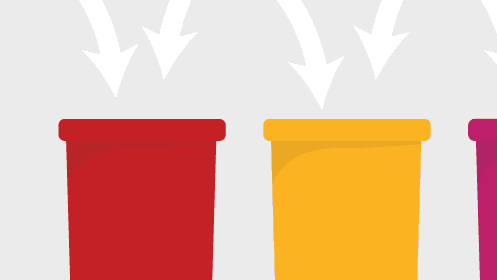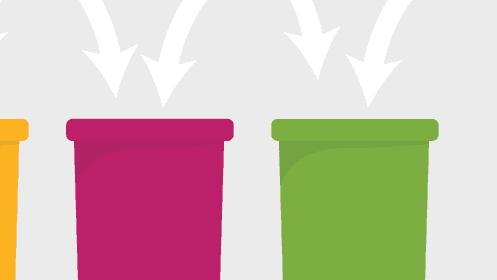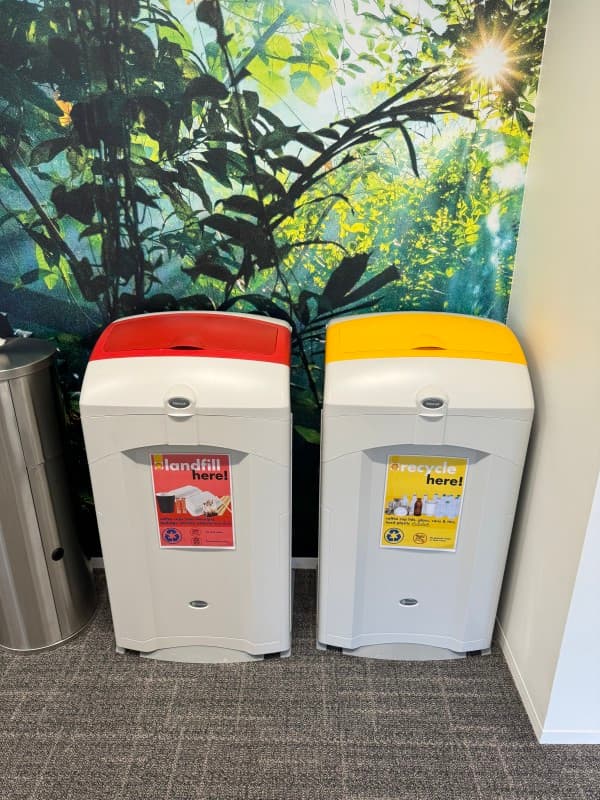The Great Rubbish Debate
5 min read
June 21, 2019

A funny feeling
You know that feeling when you’re standing in front of the bins at work trying to work out where to put that piece of rubbish. While that one finicky co-worker quietly hovers making you too scared to put anything anywhere.
Yeah, we’re just sweating thinking about it.
But never mind, we’ve got you covered – dishing the details on what should go into landfill, recycling, soft plastic recycling and food waste. And to make sure old mate is never lurking over your shoulder again in the staff kitchen, we’ve even whipped up some handy posters (see below).
Separating your waste correctly has a powerful and positive environmental impact, and that’s only the beginning. So let’s get started!

Separate soft plastic from glass and paper recycling
Soft plastic recycling
Companies like Plastic Forests and Redcycle recycle plastics into new products, helping to close the loop and encourage upcycling of plastics instead of single use. You may have seen a Redcycle bin at your local supermarket offering to take your soft plastics like single use plastic bags.
Not sure how to tell if something can go into the Soft Plastics bin? Do the scrunch test. If it’s plastic and you can scrunch it into a ball in your hand, it’s considered a soft plastic – think bread bags, chip packets and cling wrap.
Aluminium, glass and paper recycling
The good news story on this front is that materials like aluminium and glass are infinitely recyclable and some of these are still recycled in Australia. Companies like Visy are still recycling glass, aluminium and paper products, with the intention of creating new products from this waste. So, dropping these in the recycling bin is only a good thing for Mother Earth!

Seperate e-waste, batteries and food waste
E-waste & Batteries
Batteries and electronic waste (we’re talking computer parts, cables and old screens) contain hazardous chemicals and precious metals that either need to be disposed of carefully or can be reused in new electronics! Most states have their own e-waste processing systems, you can search “e-waste” and your state to find out how to dispose of e-waste safely in your area.
Batteries are an easy one, rechargeable batteries are getting cheaper, not to mention you only buy them once! So the investment will pay off in a few recharges. You can buy rechargeable batteries and chargers in most supermarkets.
Food waste
Once food waste enters landfill, it breaks down and emits greenhouse gases, including carbon dioxide (CO2) and methane (CH4) – a gas 25 times more potent than CO2. This is why one of the best ways to reduce your waste is to separate out your food waste.
This requires a compost, worm farm or council facility to break down the food waste. Some local councils allow food waste to be put into the green organic waste bin, so it’s always worth getting in touch with your local council.
In an apartment? That’s cool, you can get a Bokashi bin to divert your food waste from landfill or you can use Sharewaste to connect with neighbours already composting or who have worm-farms or chickens. You can also do a quick Google for any community gardens that take food waste or check to see if there is an organic waste recycling facility near you.

Swap, reuse and refuse
Even better than putting your waste into the correct bin, is to avoid creating waste to start with! Here’s some tips on how to do that.
Swap single use for reusable
There are a lot of products around these days that replace single-use items such as reusable coffee cups, water bottles and shopping bags. You can find more suggestions for how to reduce your plastic waste on our Plastic Free blog.
Reuse what you have
Rather than throwing away that shampoo or liquid soap container, head to a shop that allows you to refill them (examples include Ceres or the source). By turning these items from a single use item into a multiple use item, you save it from landfill – often these will last several years being refilled.
Bring your own and refuse
Forgot your lunch and hangry for a bowl of chicken teriyaki? Minimise your impact by asking for it without cutlery and the plastic bag. Plastic cutlery isn’t recyclable and why not use the metal ones in your work kitchen instead? Then you only have to recycle the bowl once you’re done. Better yet, bring your own container to fill up, or dine in to avoid the plastic completely.

What we are doing at Powershop
In the Powershop office, not only have we started separating our food waste and soft plastics to prevent them from entering landfill, but we have also created bins for coffee grounds, batteries and e-waste.
Our food waste and coffee grounds are collected by the Metropolitan Waste and Resource Recovery Group and, as a result, we are diverting around 5-6kg of food waste from landfill every day! That doesn’t sound like a lot, but the greenhouse gas that would be created from this would be roughly 1.3 tonnes each year (calculate yours here).
Batteries and e-waste are taken to a Sustainability Victoria e-waste facility, ensuring that potentially hazardous and precious materials are reused or disposed of safely. Long term we are swapping the batteries used for small electronics to rechargeable batteries to reduce our e-waste.
Check out what we are doing in our Melbourne office.
Powershop is currently retailing electricity in VIC, NSW, South East QLD, and SA and gas in some areas of VIC and NSW. Check out our plans page to confirm we're available at your address.